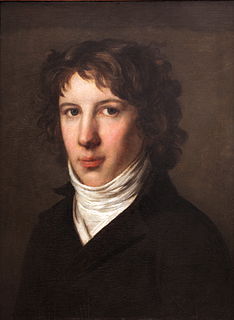A Quote by Aristotle
Excellence or virtue in a man will be the disposition which renders him a good man and also which will cause him to perform his function well.
Related Quotes
If a man of good natural disposition acquires Intelligence [as a whole], then he excels in conduct, and the disposition which previously only resembled Virtue, will now be Virtue in the true sense. Hence just as with the faculty of forming opinions [the calculative faculty] there are two qualities, Cleverness and Prudence, so also in the moral part of the soul there are two qualities, natural virtue and true Virtue; and true Virtue cannot exist without Prudence.
My conception of the audience is of a public each member of which is carrying about with him what he thinks is an anxiety, or a hope, or a preoccupation which is his alone and isolates him from mankind and in this respect at least the function of a play is to reveal him to himself so that he may touch others by virtue of the revelation of his mutuality with them. If only for this reason I regard the theater as a serious business, one that makes or should make man more human, which is to say, less alone.
I will make an average man into an average dancer, provided he be passably well made. I will teach him how to move his arms and legs, to turn his head. I will give him steadiness, brilliancy and speed; but I cannot endow him with that fire and intelligence, those graces and that expression of feeling which is the soul of true pantomime.
The legislator commands the future; to be feeble will avail him nothing: it is for him to will what is good and to perpetuate it; to make man what he desires to be: for the laws, working upon the social body, which is inert in itself, can produce either virtue or crime, civilized customs or savagery.
God, Who is by nature good and dispassionate, loves all men equally as His handiwork. But He glorifies the virtuous man because in his will he is united to God. At the same time, in His goodness he is merciful to the sinner and by chastising him in this life brings him back to the path of virtue. Similarly, a man of good and dispassionate judgment also loves all men equally. He loves the virtuous man because of his nature and the probity of his intention; and he loves the sinner, too, because of his nature and because in his compassion he pities him for foolishly stumbling in darkness.
The natural inclination of man is to rely solely upon himself and to ignore the purpose of his existence as well as his relationship to God who is his spiritual father. If man will recognize his divine origin, he will then realize his Heavenly Father will not leave him alone to grope in darkness of mind and spirit, but will make available a power to influence him in right paths and into standards of good behavior. The Holy Ghost is that power.
The service a man renders his friend is trivial and selfish, compared with the service he knows his friend stood in readiness to yield him, alike before he had begun to serve his friend, and now also. Compared with that good-will I bear my friend, the benefit it is in my power to render him seems small.
If we state the function of man to be a certain kind of life, and this to be an activity or actions of the soul implying a rational principle, and the function of a good man to be the good and noble performance of these, and if any action is well performed when it is performed in accordance with the appropriate excellence human good turns out to be activity of the soul in accordance with virtue, and if there are more than one virtue, in accordance with the best and most complete.
...the Lord said as He drew near His passion, 'Now is the Son of man glorified, and God is glorified in Him. If God is glorified in Him, God will also glorify Him in Himself; and He will glorify Him at once' (Jn. 13:31-32). From This it is clear that divine gifts follow sufferings endured for the sake of virtue.
What we suffer from today is humility in the wrong place...The old humility was a spur that prevented a man from stopping; not a nail in his boot that prevented him from going on. For the old humility made a man doubtful about his efforts, which made him work harder. But the new humility makes a man doubtful about his aims, which will make him stop working altogether.
A father would do well, as his son grows up, and is capable of it, to talk familiarly with him; nay, ask his advice, and consult with him about those things wherein he has any knowledge or understanding. By this, the father will gain two things, both of great moment. The sooner you treat him as a man, the sooner he will begin to be one; and if you admit him into serious discourses sometimes with you, you will insensibly raise his mind above the usual amusements of youth, and those trifling occupations which it is commonly wasted in.
Let a man choose what condition he will, and let him accumulate around him all the goods and gratifications seemingly calculated to make him happy in it; if that man is left at any time without occupation or amusement, and reflects on what he is, the meagre, languid felicity of his present lot will not bear him up. He will turn necessarily to gloomy anticipations of the future; and unless his occupation calls him out of himself, he is inevitably wretched.





































